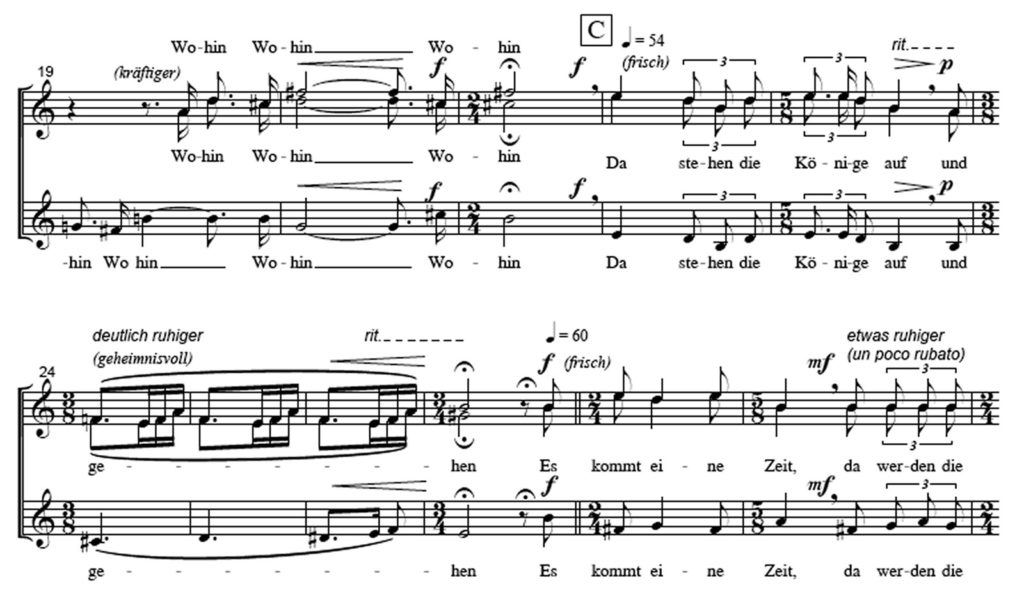Triple Play: Choral Scores Of, By and For Women
Dr. Marian Dolan
Choral Conductor
Occasionally I receive an interesting and unusual score inquiry. A few months ago, a colleague asked me for suggestions of scores with texts of women poets, with music by female composers, in settings for women’s chorus. An interesting “triple play” idea for a concert program or an ICB review column! This article was completed on International Women’s Day (8 March), a global day of celebrating the economic, political and social achievements of women past, present and future – a timely occasion to also celebrate the work of some excellent choral composers. After searching my own score files, emailing conductors and composers, and scouring the internet, here is a treasure of powerful, insightful, challenging, and fun repertoire “of-by-for” women. Some information is given here; a version of this article with live internet links to composer’s websites, scores, audio files, as well as links to poet’s information is available online (www.TheChoirProject.org).
USA
A number of fine American composer’s scores fit the “of-by-for” category. A real gem is Joan Szymko‘s The Beauty of Your Dreams, a setting of Eleanor Roosevelt’s vibrant and powerful texts: “You gain courage and strength and confidence every time you look fear the the face; cast out fear and face the unknown with courage and integrity and a high heart; the future belongs to those who dream.” Wife of the President and iconic voice of her generation, Eleanor Roosevelt wrote a newspaper column called “My Day” which appeared six days a week from 1935 to 1962, and had a readership of over 4 million. Szymko’s score beautifully embodies the clarity, reflectiveness, and strength of the texts in a homophonic choral setting for ssaa and piano.
(Click on the image to download the full score)
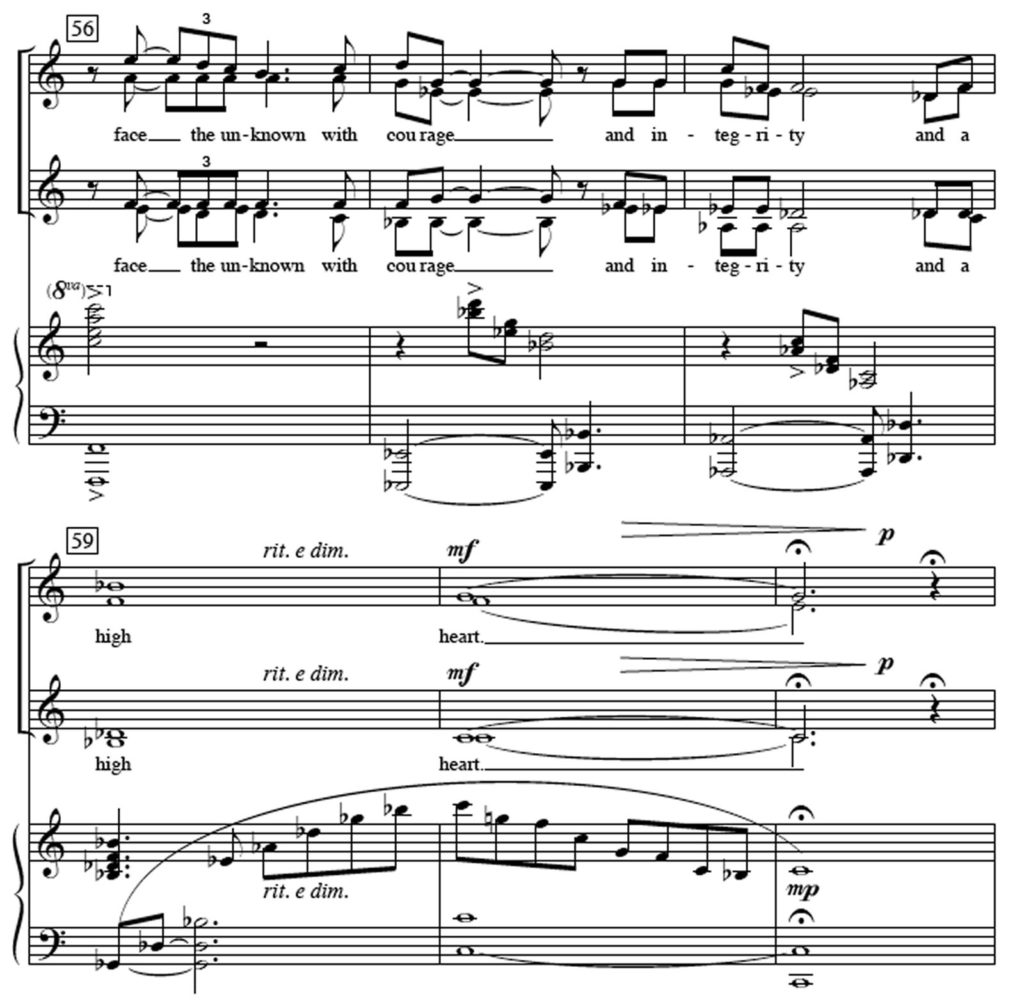
Ysaye Barnwell‘s “Crossing’s” which includes Wanting Memories and No Mirrors in My Nana’s House, was originally commissioned by choreographer David Rousseve for a dance-theater work of the same title. Sweet Honey in the Rock, the Grammy award-winning African American female a cappella vocal ensemble (www.sweethoney.org) of which Dr. Barnwell is a member, subsequently recorded both works. The six voices in Sweet Honey have a wide range, so the published choral transcriptions / arrangements of these pieces are notated as 5-part mixed-voice, but can be sung by a women’s ensemble which, like Sweet Honey, has strong low altos. The rhythmic propulsion of Memories carries the unfolding story, written by the composer: “I am sitting here wanting memories to teach me to see the beauty of the world through my own eyes. I think on the things that made me feel so wonderful when I was young … that made me laugh, made me dance, made me sing … that made me grow into a being full of pride.”
(Click on the image to download the full score)
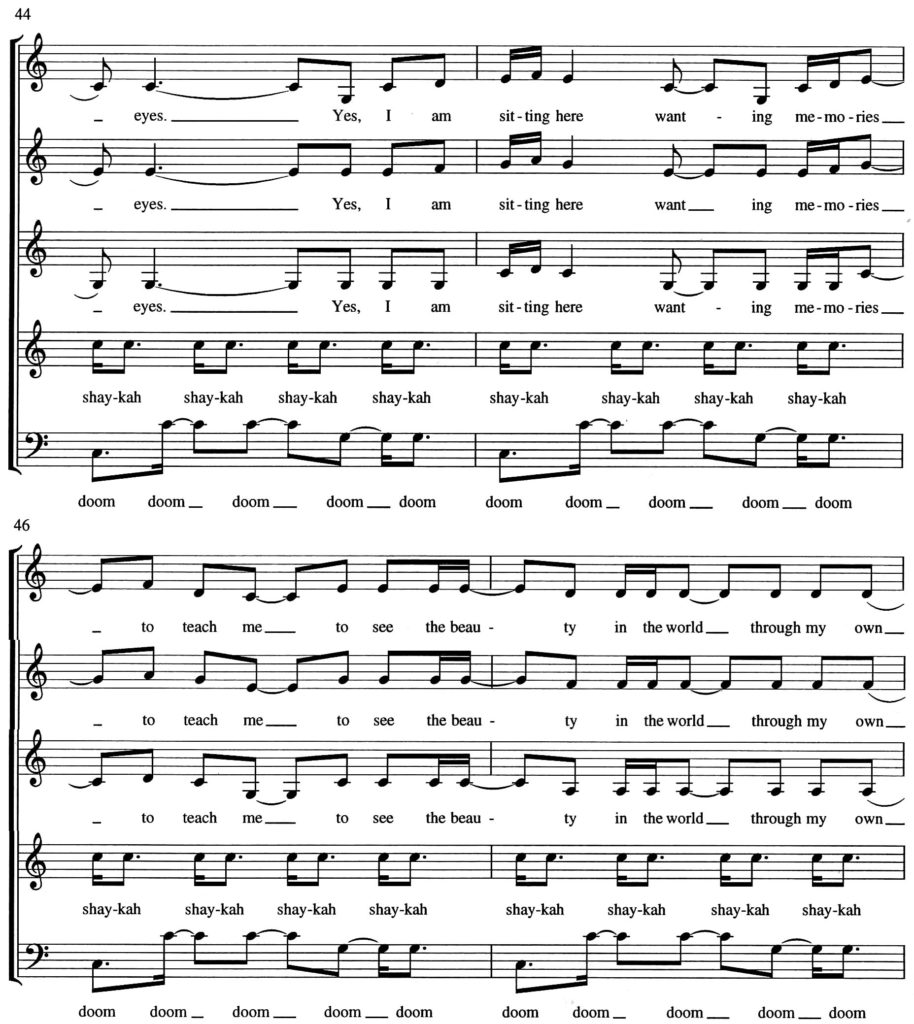
No Mirrors is the story of a young AfricanAmerican woman who grew up knowing her own value not by looking into a mirror but by looking into her reflection in her grandmother’s eyes: “There were no mirrors in my Nan’s house, and the beauty that I saw in everything was in her eyes … I only knew love and I didn’t know hate.”
A powerful, up-tempo gospel piece is Rosephanye Powell‘s Still I Rise, scored for ssaa, soloist and piano with optional bass and drum set. As the composer explains, “Still I Rise was inspired by the poem of the same name by poet laureate Maya Angelou. It is a women’s anthem, saluting the strength of women to persevere through life’s difficulties: low self-esteem, physical and emotional abuse, rape, incest, prejudice, abandonment, and such like. In summary, though a woman’s life or past may be filled with tears and heartaches, with each day that she finds herself still living, she finds that she has grown stronger and risen a little higher because her circumstances have not overcome her. Thus, every new day can be one of hope and joy because regardless of the past, today, ‘still I rise!’” Scored for ssaa divisi, Rise is rhythmically powerful and energetic for the chorus, and takes a good gospel soloist who can improv in the ‘shout’ section of the score. An audio sample is on the composer’s website.
(Click on the image to download the full score)
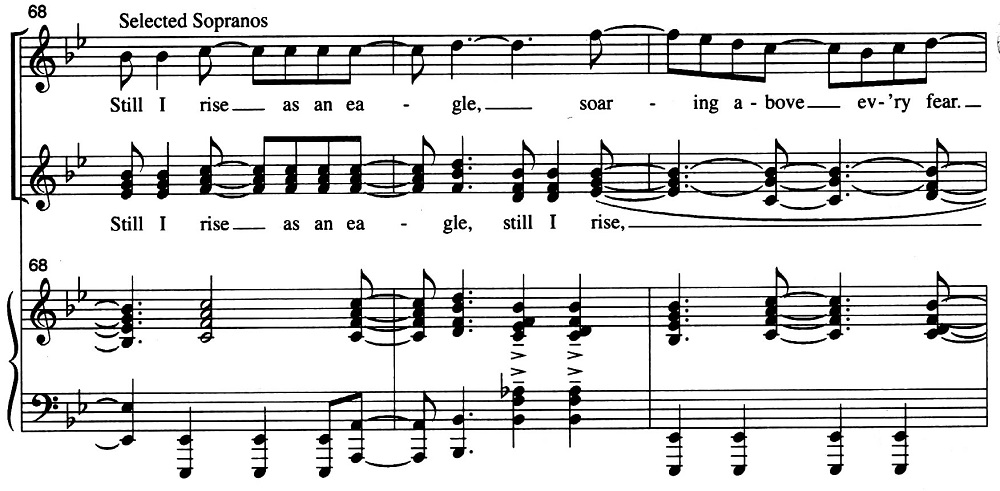
Carol Barnett‘s The Day of Hope is an accessible three-movement, 12 minute work in honor of Shirin Ebadi, Iranian human rights lawyer and recipient of the 2003 Nobel Peace Prize. The score includes Ebadi’s texts along with those of Persian poets of the 11th through 14th centuries, all of which speak of human rights and freedom from violence. “The music is a free translation into the Western choral idiom of traditional Persian music, its exotically ornamented monody…” explains the composer. Oboe, harp and percussion instruments including doumbek, sistrum, rain stick and rattles accompany voices, mainly homophonic, which are often in two or three parts. Truly a beautiful and very powerful score.
Chant for Great Compassion was written by Abbie Betinis in response to the earthquake that took the lives of nearly 70,000 people in Sichuan Province, southwestern China, in May 2008. Betinis explains that her score “is for anyone in any need or trouble. It is about calling out for strength and courage – as individuals and also on behalf of our generation. The opening melody is inspired by the traditional chant to the Buddhist goddess Guan Yin, whose name means ‘she who hears the cries of the world’. To comprehend the needs of so many, her head split into eleven pieces, hence the 11-part chords in the score.” Voiced for ssaa-divisi, the texts in the score are from Chinese writer and elegant orator Qiu Jin, Sichuan journalist and editor Wang Erbei, and the 7thc Great Compassion Mantra.
- Joan Szymko (www.joanszymko.com): Beauty ofYour Dreams (Eleanor Roosevelt; Eng; ssaa, pf; 5′; Santa Barbara #564), Always Coming Home (Ursula LeGuin; Eng; ssaa, vc, pf; 6′; Roger Dean #15/2447R), The Singing Place (Lily Long; Eng; ssaa, pf; 6’30; Earthsongs S-305), Circle (Hadewijch II, 13c; Eng; ssaa; 2’30;Treble ClefTC-192), As aWoman (Virginia Woolf; Eng; ssa; 2’10; via composer); You are the Music (Amy Lowell; Eng; ssaa, pf; 5′; Santa Barbara #804).
- Ysaye Barnwell (www.ysayebarnwell.com): Wanting Memories (Y. Barnwell; Eng; ssaaa; 5′; Musical Source YMB-103), No Mirrors in My Nana’s House (Y. Barnwell; Eng; ssaaa; 3′; Musical Source YMB-101).
- Rosephanye Powell (www.rosephanyepowell.com): Still I Rise (R. Powell; Eng; ssaa, solo; 4′; Gentry #JG2346)
- Carol Barnett (www.carolbarnett.net): The Day of Hope (Shirin Ebadi, et al; Eng; ssaa, ob, perc, harp; 12′; Roger Dean 45/1159R), Song of Perfect Propriety (Dorothy Parker; Eng; ssa, pf; 4′, Earthsongs S-291)
- Abbie Betinis (www.abbiebetinis.com): Chant for Great Compassion (Qiu Jin, Wang Erbei, trad. 7c; Eng; ssaa-divsi; 5’30; self-published)
Other scores:
- GwynethWalker (www.gwynethwalker.com): To Sing is to Fly (Joan Baez; Eng; ssaa, pf; 3′; “Love is a Rain of Daimonds” from Songs forWomen’sVoices (set of six texts by May Swenson; Eng; ssaa, pf; ECS Publishing #5023)
- Jocelyn Hagen (www.jocelynhagen.com): Joy (SaraTeasdale; Eng; ssa, vln, pf; 3’30; self-published); Under the Stars, One Holy Night (Anna Driscol; Eng; treble + women, 2 C instr, pf; 3′; self-published)
- Sally Lamb: The Sadness of the Sea (Lydia Sigourney, Emily Dickinson and Henry Longfellow; Eng; ssaa-div, pf; 9′; Roger Dean #45/1151R)
- Elizabeth Alexander: I Write this Poem Out of Darkness (George Ella Lyon; Eng.; ssa, fl, vln, pf; 7′; Seafarer Press); Why I Pity the WomanWho Never Spills (Joan Wolf Prefontaine; Eng; ssaa; 5′; Seafarer Press)
- Emma Lou Diemer: Hope is aThing: An Emily Dickinson Suite (E. Dickinson; Eng: ssa, pf;Treble ClefTC-207)
- JanikaVandervelde: Dance Ablaze! (Jody Johnson; Eng; ssaa opt. perc; Earthsongs S-190), Positive Women: Susan (Susan Gladstone; sa, vln, narrator; Earthsongs W-29)
- Naomi Stephan: O virtus Sapientie / O Excellence of Wisdom (Hildegard of Bingen; L; ssa, vibraphone, marimba;Treble Clef TC-209); Hodie (Hildegard von Bingen; L; sssaa, 2 sop;Treble ClefTC-127)
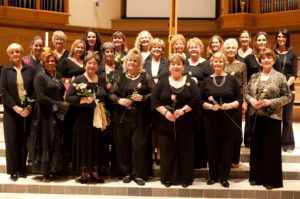
Canada
Eleanor Daley, based inToronto, has garnered quite an enthusiastic following for her scores. From her larger work Requiem, comes In Remembrance, originally voiced for mixed choir, now available for women.The text, often cited as ‘anonymous,’ is now known to be by Mary Elizabeth Frye: “Do not stand at my grave and weep, I am not there, I did not sleep; I am a thousand winds that blow, I am the diamond glint on snow…”The imagery is treated largely homophonically with great lyric sensitivity and rubato. The Gate of theYear, scored for ssaa and soloist sets Minnie Haskins uplifting text, “Give me a light that I may tread safely into the unknown. Lux aeterna.” Ruth Henderson‘s When I am an Old Woman is pure fun! Nancy Telfer‘s Fireworks literally embodies in sound-syllables a fireworks display complete with crackling, fizzing, popping and explosions of vocal colors! Rachel Sauvé‘s Automne, beautiful settings of ancient Japanese texts, is a hidden gem.
- Eleanor Daley: In Remembrance (Mary Elizabeth Frye; Eng; ssaa; 3′; Alfred Music VG-272); The Gate of theYear (Minnie Louise Haskins; Eng; ssaa, S solo; Walton Music); Echo (Christina Rossetti; Eng; ssaa, pf; Alliance #639)
- RuthWatson Henderson: When I Am an OldWoman, I Shall Wear Purple (Jenny Joseph; Eng; sa-div, pf; Roger Dean 15/2594R); Landscape (Lucy Jun; Eng; ssaa,pf;Treble Clef TC-264)
- Nancy Telfer: Butterfly (N.Telfer; Eng; Eng; ssa acap; Earthsongs S-27), Fireworks (N.Telfer; syllabic; sssaaa; 5′; Edition Choris Mundi #11.07.149).
- Rachel Sauvé: Automne:Trois Poèmes Japonais (anon; ssa-div; www.myspace.com/rachelsauve)
Europe
Finland has experienced a strong resurgence in ancient women’s texts and traditions, which, in turn, has influenced the creation of many new settings and arrangements of these stories and texts for women’s ensembles, including: Riikka Talvitie: Jako (Helena Sinervo; Fin; ssaa; 5′; Sulasol); Mia Makaroff: Namnlösa klippan and Kämpande: För att minas (Heidi von Wright; Swe; ssaa; Sulasol); Kynnykselia (M. Makaroff); Tellu Turkka: Enkelit / Angels, Minne kauneus katosi, Etsijä / Seeker, Mehiläinen (ssaa-div; Sulasol); Others: Säde Rissanen, Liisa Matveinen, Anna Mari Kähärä
Sweden’s Karin Rehnqvist has set a number of texts by Edithe Södergran, a Swedish-speaking Finn, who endured the Russian Revolution, extreme poverty and died of the effects of tuberculosis at 31: Ingenting / Nothing (Edith Södergran; Sw/Eng; ssaa, alto fl; 6′; Ed. Reimers); Ljusfålten / Fields of Light (Edith Södergran; Sw; ssaa; 2′; Ed. Reimers); Trumf att finnas till / ATriumph to Exist (Edith Södergran; Sw; ssaa; 11′;Ed. Reimers). Susanne Rosenberg, recognized as a leader in Sweden’s various folk traditions, has any number of folk-inspired settings (www.susannerosenberg.com).
One of Estonia’s most important living composers is Ester Mägi. Two of her 8 treble scores have texts by female writers (SP Muusikaprojekt #2504 – Mägi collection): Kauge maa / A Distant Land (Katrin Väli; Est; ssaa; 2′), Kevad-sonett / Spring Sonnet (Marie Under; Est; ssaa; 3′). So also Miina Härma‘s Ei saa mitte vaili olla / I Cannot Remain Silent (Anna Haava; Est; ssaa; 2′).
(Click on the image to download the full score)
In an “of-by-for” review, one would naturally think of the stunning chants and texts by medieval German abbess Hildegard von Bingen. Contemporary German composer Sylke Zimpel‘s (www.sylkezimpel.de) treble scores frequently appear on European festival and competition lists. Most are published by Edition Choris Mundi (ECM). Some examples include: Antwort (Rose Ausländer; Ger; ssa; 1’20; ECM-11.09.189); … dass Töne tragen können (Hildegard Jahn-Reinke; Ger; ssa, S solo; 1’25; ECM-11.06.102); Und oben schwimmt die Sonne davon (Elisabeth Borchers; Ger; ssa, solos, speaker and sound-bowl; 12-score cycle, ECM-31.06.104115); Dreistufige Drohung (Sarah Kirsch; Ger; ssa; 1’20; ECM11.09.101).
The land of the Scots, in song and text and tradition, is embodied Sheena Phillips‘ scores by-of-for women (published by www.canasg.com or www.sheenaphillips.com). Incantation for ssa, is the traditional Gaelic invocation of St. Brigit. Land o’ the Leal (ssaa) is an arrangement of Lady Nairne’s lullaby and lament for a lost child. The Winter Wood (ssa, pf) is a 10 minutes, 3-part cantata based on the poetry of Jean Kenward. Phillips also set three Emily Dickinson texts in the score Sea Pieces for ssa choir.
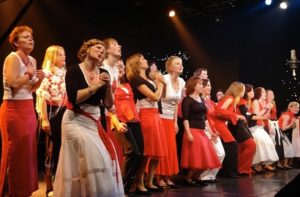
Australasia
Australian Sandra Milliken‘s (www.sandramilliken.com.au) “by-for-of” scores include a setting of her own text in The Gift (ssaa or sa, pf; Sulasol) and 5 piece collection Lumi ja jää / Snow and Ice for ssaa to texts by Kirsi Reinikka (Sulasol), a Finnish professor at the Univ. of Queensland in Australia. The Gift is about “looking for the beauty in everything, especially the small things, like in nature, in the tiniest flowers. I think that finding beauty in music can also be found in the smallest details – word painting, nuanace, etc.” New Zealand “by-for-of” scores include Train Song by Cheryl Camm (www.cherylcamm.co.uk) for sssaa to a text by Lauris Edmond, Jenny McLeod‘s settings of Janet Frame’s poetry, and Dorothy Ker‘s close-up of a daisy (ssaa) to a text by Ruth Dallas.

So for all of you who conduct women’s ensembles, have a grand time planning “of, by, for” programs. And please send me information on your favorite scores for a second “of, by, for” column!
